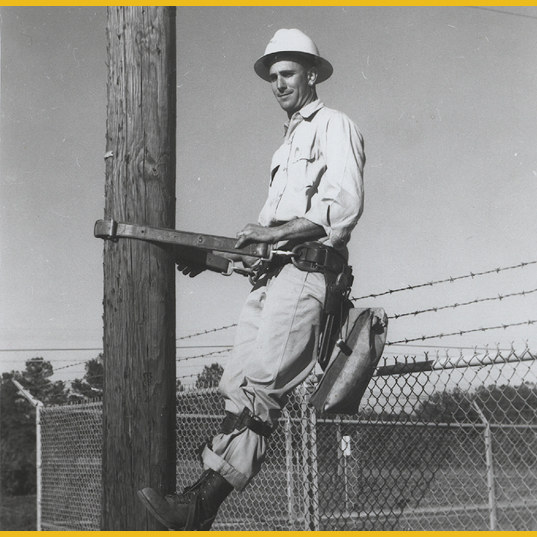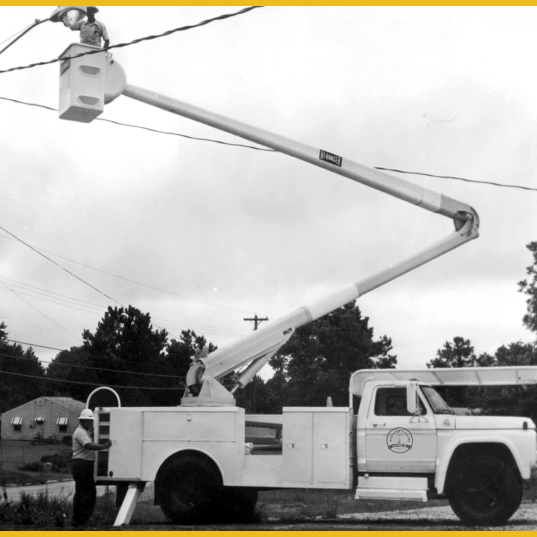Forming the local co-op
According to Caudle’s history, it was in either April or May of 1936 when Troup County Extension Agent John Anderson accompanied M.O. Swanson, an REA representative from Washington D.C., into Caudle’s store. “He wanted to know what we had done about electricity in Mountville,” the storeowner recalled. “I told him we had not gotten anywhere with it.”
Swanson, the REA’s first chief engineer, asked Caudle to meet with him and others interested in the electric program the next afternoon. Swanson, Anderson and Caudle, along with about 25 others, gathered at the Troup County Court House the next day. With a promise from Washington D.C. that loans would be made available to cooperative groups seeking to electrify their communities, those gathered elected H.H. Greene of West Point as chairman of the loosely organized group. Within a few weeks, a petition for incorporation was filed in the Office of the Clerk of Superior Court. Caudle was at the courthouse that day on June 11, 1936, accompanying Attorney Render Terrell as he applied for the charter.
“One or two people laughed at him, for they didn’t think we would ever be granted a charter and if so, it would never work,” Caudle recalled.
But on July 9, 1936, the charter was granted and the new cooperative was named Troup County Rural Electrification Corporation. (In January 1938, the name was changed to Troup County Electric Membership Corporation; eventually “County” was dropped and Troup Electric Membership Corporation was the name it went by until 2002 when the co-op became Diverse Power Incorporated.)
The co-op’s first legal meeting was held the next day, on Friday, July 10, 1936. Seven directors were elected, including E.P. Cook who was named president; Grady Market, secretary and treasurer; and Paul A. Potts, vice president. Other directors were J.W. Combs, H.H. Greene, F.M. Freeman and Caudle. The contract for the first 76.7 miles was officially let on October 28, 1936.
Convincing the community
Between the times the charter was granted and electricity was switched on, the rural folks of Troup County had to be convinced the project would work. Caudle’s memories coincide with recollections of other rural electric pioneers across the nation who encountered much the same response from their neighbors as they sought easements in order to run electric lines. In his own words, Caudle relates the opinions of the day, the mood and attitude of the mid-1930s in Troup County as he and other co-op representatives struggled to light up the rural roadsides:
“Each director did his part, driving up and down the then-unpaved roads getting easements and membership fees’ The late Julian Jones Sr. and I would take a sack of sandwiches and get in my Model car and work hard all day trying to get people to sign applications and right-of-way easements’ I recall going to one farmer while he was plowing. We told him what we wanted to do and asked him if he would sign an easement. He sat down on his plow and signed it, then asked us when would he get electricity. Very few times were we that lucky.”
Often, it seemed, the fierce independence of country folk produced skepticism in government projects and newfangled technology. The ladies, according to Caudle, were less skeptical, realizing that electric power would allow them to retire their scrub boards, wood stoves and kerosene lanterns. Others, though, feared electricity might burn down their homes.
“Some days we would get very blue, ready to give up,” Caudle recalled. “I remember what one very old man told me once. ‘Son,’ he said, ‘as long as you have God Almighty and the women folks back of you, go ahead.’ We were sure about the women but not too sure about the other party.”
The directors plowed on, though, and by mid-January of 1937, all right-of-way easements had been signed. Line construction already had begun on Mountville Road and, with all easements secured, pole and line placement could continue, full speed ahead.
In March, the EMC hired its first manager, J.K. Jones, and paid him $30 a week. At the March board meeting, a committee from Gray Hill approached the directors with a map showing easements covering close to seven miles of new lines they wanted built. At the April meeting, more citizens came asking the directors to build lines leading to their farms. All of a sudden, everyone wanted to get in on the action, even those who had earlier resisted.
On May 6, 1937, the first switch for rural electricity in Troup County was flipped, and electric power lines west of LaGrange were energized, almost two years to the day after FDR enacted the REA. In appreciation of the co-op’s tireless efforts, Fuller E. Callaway, the local textile magnate, treated Troup EMC directors to a steak supper at his boathouse on Country Club Road that night.
Thirty-two years later, Caudle, still serving on the board of directors, marveled at how the co-op not only had survived-but also had thrived. In 1969, he couldn’t help but tout the local cooperative he had worked so hard to make viable: “They told us years ago it was not practical, that it would never work.”
Caudle, and west Georgia’s other rural electric pioneers, had proved them wrong.
Local legacy
On April 12, 1995, close to 6,000 people joined President Bill Clinton in Warm Springs to remember FDR on the 50th anniversary of his death. Held on the front lawn at The Little White House, the annual commemorative ceremony featured an address by President Clinton and speeches by former President Jimmy Carter and former Atlanta mayor and ambassador Andrew Young.
But it was Anne Roosevelt, the Depression-era president’s granddaughter, who spoke of how important it was to her family to be in Warm Springs that day, at the west Georgia retreat her grandfather sought from the pressures of Washington, D.C., and home of the soothing warm waters that comforted the polio patient.
Here, we’ve heard some wonderful stories of our grandfather and we’ve seen the simplicity and earthiness of his ideas, Anne Roosevelt said that day; chief among those ideas was FDR’s work to bring electricity to the countryside. She addressed mostly residents of Warm Springs and west Georgia when she added: “We who bear his name by birth do not own his legacy. You do.”
In her own way that day, FDR’s granddaughter recognized Warm Springs as the birthplace of rural electricity, just as the president had, decades before.
At Diverse Power, we continue to provide power throughout the same countryside that first attracted Roosevelt’s attention to his neighbors’ need for electric power.
It was here in Meriwether, Harris, Troup, Heard, Coweta and Muscogee counties that FDR traveled in his roadster, greeting farmers and forming ideas for his New Deal policies, including establishing rural electricity.
It is here in these same communities and in Quitman, Randolph, Clay, Calhoun and parts of Dougherty, Early, Stewart and Terrell counties in Southwest, GA. Chambers County, AL as well, that Diverse Power continues to serve the electric-related needs of our neighbors.









